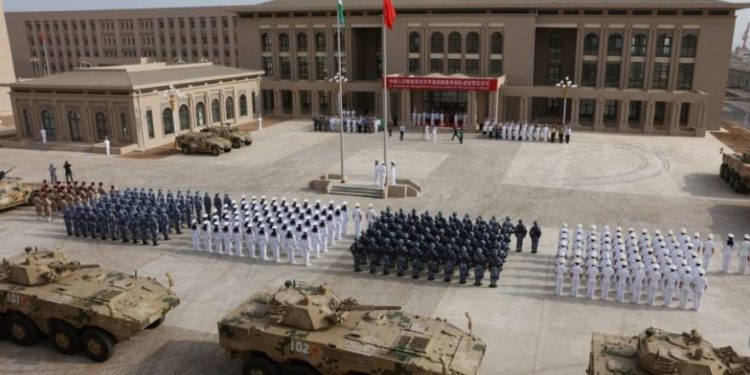On Sunday, a spokesman for China’s defense ministry blasted the U.S. as the “destroyer of world peace” while criticizing an annual Pentagon report on Beijing’s increasingly belligerent military goals.
This statement is a rebuttal of the Pentagon’s annual report to Congress on Chinese military developments and goals that was released in early September. According to the report, Chinese goals may have “serious implications for U.S. national interests and the security of the international rules-based order.”
Spokesman Colonel Wu Qian called the Department of Defense’s report a “wanton distortion” of China’s intentions.
“Many years of evidence shows that it is the U.S. that is the fomenter of regional unrest, the violator of the international order and the destroyer of world peace,” he said.
He added that U.S. actions in Iraq, Syria, Libya, and other countries, is responsible for the deaths of over 800,000 people and the displacement of millions.
“Chinese military advancement was driven by defending national sovereignty, safety, and development. It is not against any country and would not threaten any country,” Wu Qian said, adding that the U.S. report was a display of “hegemony and provocation.”
“Rather than reflecting on itself, the U.S. issued a so-called report that made false comments about China’s normal defense and military construction,” he added. “We call on the U.S. to view China’s national defense and military construction objectively and rationally, cease making false statements and related reports, and take concrete actions to safeguard the healthy development of bilateral military relations.”
The Defense Department’s 200-page report looks in detail at the PLA’s technical capabilities, doctrines, and the ultimate aims of China’s military buildup.
Allowing that many factors will influence how the Chinese government plans to implement its goals, the report said: “What is certain is that [the Chinese Communist Party (CCP)] has a strategic end state that it is working towards, which, if achieved and its accompanying military modernization left unaddressed, will have serious implications for U.S. national interests and the security of the international rules-based order.”
China, which already has the world’s largest standing military, now also has the world’s largest navy with approximately 350 ships and submarines. The United States in comparison has 293 ships and submarines.
China is building an increasingly larger arsenal of land-based ballistic and cruise missiles. It has one of the world’s largest forces of advanced long-range surface-to-air systems, the report said.
Already have an account? Sign In
Two ways to continue to read this article.
Subscribe
$1.99
every 4 weeks
- Unlimited access to all articles
- Support independent journalism
- Ad-free reading experience
Subscribe Now
Recurring Monthly. Cancel Anytime.
In 2019, the PRC launched more ballistic missiles for testing and training than the rest of the world combined.
The PRC is also developing new intercontinental ballistic missiles (ICBMs) that will significantly improve its nuclear-capable missile forces and will require increased nuclear warhead production, partially due to the introduction of multiple independently targetable reentry vehicle (MIRV) capabilities.
“Over the next decade, China will expand and diversify its nuclear forces, likely at least doubling its nuclear warhead stockpile,” the report stated, adding that the number of nuclear warheads will far exceed the size of a “minimum deterrent.”
Specifically, regarding Taiwan, over which the saber-rattling continues, the PLA’s official military budget last year was 15 times that of Taiwan “with much of it focused on developing the capability to unify Taiwan by force,” according to the Pentagon’s report. China “appears willing to defer the use of military force as long as it considers that unification” with the island “could be negotiated over the long term and the costs of conflict outweigh the benefits,” the report said.
China’s own bellicose statements towards the island deflect tensions on Taiwan itself: “The cause of the current tensions in the Taiwan Strait is the [ruling] Democratic Progressive Party’s attempt… to resist reunification with force as well as external anti-China forces’ attempts to… split China,” the Chinese Defense Ministry said.
“If anyone dares to try to separate Taiwan from China, the People’s Liberation Army will take all necessary measures to resolutely defeat any attempts to interfere in China’s internal affairs or undermine peace and stability in the Taiwan Strait.”
The rhetoric between Beijing and Washington has ramped up in recent months with issues between the two superpowers ranging over trade, technology, industrial espionage, Taiwan, and the South China Sea. Secretary of State Mike Pompeo has called the CCP “the single greatest threat to the United States.”










COMMENTS